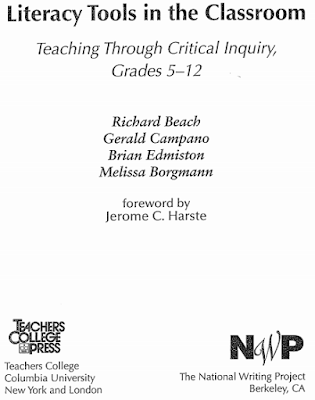*This post has been written as part of my journey through my Master’s Degree in Curriculum & Planning through Brandon University This week our Internet for Teachers (#BU755) class delved into the question of: Why are there disparate views towards the effectiveness of technology in education? Middle School Enrichment Courses. (2016). Uploaded by ASB Online Academy. Available online at: http://www.asbacademy.org/asb-middle-school-enrichment-courses/ When it comes to educational technology (ed tech) I find that it can be one of those ed topics that can become incredibly polarizing. You either find educators who are enthusiastically supportive of the implementation of various forms of ed tech… Read More
ICT for Teachers – Back in the Blogging Game!
*This post has been written as part of my journey through my Master’s Degree in Curriculum & Planning through Brandon University Hello? Is there anyone in the blogosphere that still has me added to their RSS feed? If so, THANK YOU! If you are joining me as part of class #BU755 then welcome! It has been a long absence from this blog (over a year in fact) but that doesn’t mean I’m not still here! In fact I check into my blog pretty regularly as it was my constant source of documentation over the past 4 years. I often check… Read More
Digital Literacies Chapter Review
I recently read the chapter, Digital Literacies: Virtually Connecting and Collaboratively Building Knowledge, from the book, Literacy Tools in the Classroom, by Richard Beach et al. Here are my thoughts: As members of the future workforce and society, today’s students require guidance and education in order to successfully navigate and utilize the digital world that they were born into. Acknowledging the importance of becoming digitally literate, Beach, Campano, Edmiston, and Borgmann (2010, p. 109) share four literacy skills that students develop through the use of various digital tools. The authors summarize the literacies of multimodality, hyperlinking, connectivity, and… Read More
Consider This….
I was introduced to this video last night during one of my master’s classes. New Literacies for a New Age. (2008). Uploaded to YouTube by Margaret Meijers. Available online at: https://www.youtube.com/watch?v=hs2YPGTEWGU Thoughts?
Philosophical & Cognitive Foundations of an ICT Curriculum
One of our projects this semester is to develop components of a curriculum within a group setting. I am very lucky because my partner is not only interested in technology as well but also lives in our area and is already a good friend of mine; lucky me! 🙂 We have been working on a middle-years Digital Literacy curriculum that is designed to be implemented cross-curricularly. If you read my previous post you know that a big chunk of our class has been spent on the theory behind strong curriculum development. As such, this is our theoretical foundations for our… Read More
Indigenizing the Curriculum
As professionals tasked with the education of Canadian youth, educators require understanding of First Nations, Metis, and Inuit practices, in order to effectively apply appropriate pedagogy within their classrooms. Deyhle, Swisher, Stevens, and Galvan (2008, p. 344) illustrate the process in which Indigenous peoples of North America have fought towards building an educational model that addresses the biases found in current models and strives to reshape education from an epistemological perspective. The authors’ lament over the multiple instances of cultural genocide through post-colonial education systems and call for a shift to self-determination in Indigenous education (Deyhle et al,… Read More
How Does Theory Help Curriculum Development?
The curriculum development process can be organized into four, seven, or more steps depending on which model and theorist the development plan is based on (Ornstein & Hunkins, 2013, pg. 13). Regardless of the model that is chosen, curricularists need to recognize that curriculum development is a lengthy process that requires professionals to make judgements to best serve the social and political realities of their situation while meeting the needs of a diverse group of learners (Ornstein & Hunkins, 2013, pg. 13). A strong theoretical background is essential for curricularist to ensure that their curriculum development is backed by the… Read More
Further Thoughts on the Education Paradigm
*This post has been written as part of my journey through my Master’s Degree in Curriculum & Planning through Brandon University Changing the Education Paradigm. (2008) Uploaded to TED. Availble onine at: https://www.ted.com/talks/ken_robinson_changing_education_paradigms Sir Kenneth Robinson’s speech, “Changing the Education Paradigm” has recorded over 1.6 million views through the TED platform and countless more through the various versions uploaded online through text and video platforms. The video is viewed by everyone from pre-service teachers and educational PD attendees to parents and businessmen/women around the world. The graphics of the video and charisma of Robinson make for an engaging video that… Read More
Foundational Understandings: Curriculum, Instruction, Theory & Practice
*This post has been written as part of my journey through my Master’s Degree in Curriculum & Planning through Brandon University. Can you differentiate between curriculum and instruction? Levin (2008) stated that “curriculum is an official statement of what students are expected to do”. This changes depending on the subject manner, grade level, and abilities of the student(s). Instruction is how an educator assists students in their journey towards understanding. Levin, B. (2008). Curriculum policy and the politics of what should be learned in schools. In M. Connelly, F.M. He, & J. Phillion (Eds.). The SAGE handbook of curriculum and instruction. Thousand… Read More
Changing the Education Paradigm…. But How?
*This post has been written as part of my journey through my Master’s Degree in Curriculum & Planning through Brandon University. Changing the Education Paradigm. (2008) Uploaded to TED. Availble onine at: https://www.ted.com/talks/ken_robinson_changing_education_paradigms Sir Kenneth Robinson’s speech, “Changing the Education Paradigm” has recorded over 1.6 million views through the TED platform and countless more through the various versions uploaded online through text and video platforms. The video is viewed by everyone from pre-service teachers and educational PD attendees to parents and businessmen/women around the world. The graphics of the video and charisma of Robinson make for an engaging… Read More


